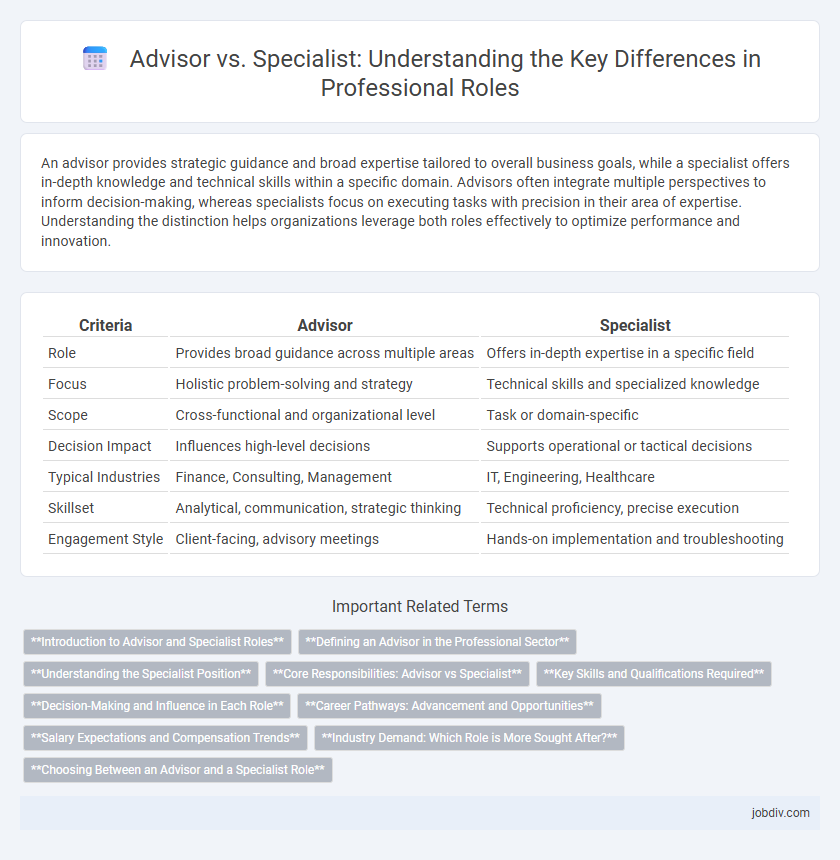An advisor provides strategic guidance and broad expertise tailored to overall business goals, while a specialist offers in-depth knowledge and technical skills within a specific domain. Advisors often integrate multiple perspectives to inform decision-making, whereas specialists focus on executing tasks with precision in their area of expertise. Understanding the distinction helps organizations leverage both roles effectively to optimize performance and innovation.
Table of Comparison
| Criteria | Advisor | Specialist |
|---|---|---|
| Role | Provides broad guidance across multiple areas | Offers in-depth expertise in a specific field |
| Focus | Holistic problem-solving and strategy | Technical skills and specialized knowledge |
| Scope | Cross-functional and organizational level | Task or domain-specific |
| Decision Impact | Influences high-level decisions | Supports operational or tactical decisions |
| Typical Industries | Finance, Consulting, Management | IT, Engineering, Healthcare |
| Skillset | Analytical, communication, strategic thinking | Technical proficiency, precise execution |
| Engagement Style | Client-facing, advisory meetings | Hands-on implementation and troubleshooting |
Introduction to Advisor and Specialist Roles
Advisors provide strategic guidance and insights based on broad industry knowledge to support decision-making processes, while specialists offer in-depth expertise in specific technical or functional areas to solve complex problems. Advisors often work across departments, influencing organizational strategy, whereas specialists focus on delivering specialized solutions within their domain. Understanding the distinction between these roles enhances effective collaboration and resource allocation in professional settings.
Defining an Advisor in the Professional Sector
An advisor in the professional sector provides strategic guidance and expert recommendations to help organizations achieve specific goals, leveraging broad industry knowledge and experience. Advisors analyze complex situations, identify opportunities for improvement, and support decision-making processes without necessarily executing tasks directly. Their role emphasizes long-term impact and value creation by aligning professional insights with organizational objectives.
Understanding the Specialist Position
A specialist holds deep expertise in a specific domain, enabling them to provide focused solutions and technical guidance within their field. Their role often involves applying advanced knowledge to solve complex problems, support project implementation, and drive innovation. Organizations rely on specialists to deliver precision and enhance performance in areas requiring specialized skills or industry-specific insights.
Core Responsibilities: Advisor vs Specialist
Advisors concentrate on providing strategic guidance, leveraging their broad industry knowledge to influence decision-making and long-term planning. Specialists focus on deep expertise within a specific domain, executing technical tasks and solving complex problems related to their niche. Core responsibilities of advisors involve consulting and mentoring, while specialists are responsible for hands-on implementation and detailed analysis.
Key Skills and Qualifications Required
Advisors typically require strong communication skills, strategic thinking, and a broad understanding of industry trends to provide comprehensive guidance and decision-making support. Specialists need deep technical expertise, advanced problem-solving abilities, and extensive knowledge in a specific domain, such as IT, finance, or law, to address complex and niche challenges. Both roles benefit from continuous professional development and certifications relevant to their respective fields, ensuring up-to-date knowledge and credibility.
Decision-Making and Influence in Each Role
Advisors guide decision-making by providing strategic insights and broad perspectives that shape organizational direction, while specialists influence decisions through deep technical expertise and focused problem-solving within specific domains. The advisor's role emphasizes big-picture impact and stakeholder alignment, whereas the specialist drives precision and effectiveness in implementation. Both roles are pivotal, with advisors steering choices and specialists ensuring those decisions are executed with expert knowledge.
Career Pathways: Advancement and Opportunities
Advisors often advance through roles in client management, strategic planning, and leadership positions, leveraging broad expertise to guide organizational decisions and foster growth. Specialists typically progress by deepening technical knowledge, obtaining certifications, and taking on advanced projects or research roles that require niche expertise. Both pathways offer distinct opportunities for career advancement, with advisors moving towards managerial roles and specialists advancing through technical mastery and innovation.
Salary Expectations and Compensation Trends
Advisors typically command higher salary expectations due to their strategic decision-making roles and client-facing responsibilities, with median compensation often exceeding $90,000 annually. Specialists, while highly skilled in niche areas, generally experience steadier but lower salary growth, averaging around $70,000 to $85,000 depending on industry and expertise. Compensation trends indicate increasing bonuses and performance incentives for advisors linked to measurable business outcomes, whereas specialists benefit more from structured salary increments and certification-based pay improvements.
Industry Demand: Which Role is More Sought After?
Industry demand consistently shows that specialists are more sought after for their deep, technical expertise in niche fields, especially in technology and healthcare sectors. Advisors, while valued for strategic insight and broad knowledge, face higher competition as generalists within corporate environments. Hiring trends reveal increasing investments in specialists to address complex challenges and drive innovation.
Choosing Between an Advisor and a Specialist Role
Choosing between an advisor and a specialist role depends on the scope of expertise and strategic involvement required. Advisors provide broad insights and guide decision-making across multiple domains, while specialists offer deep technical knowledge in specific fields. Organizations prioritizing holistic strategy benefit from advisors, whereas those needing targeted problem-solving rely on specialists.
Advisor vs Specialist Infographic

 jobdiv.com
jobdiv.com